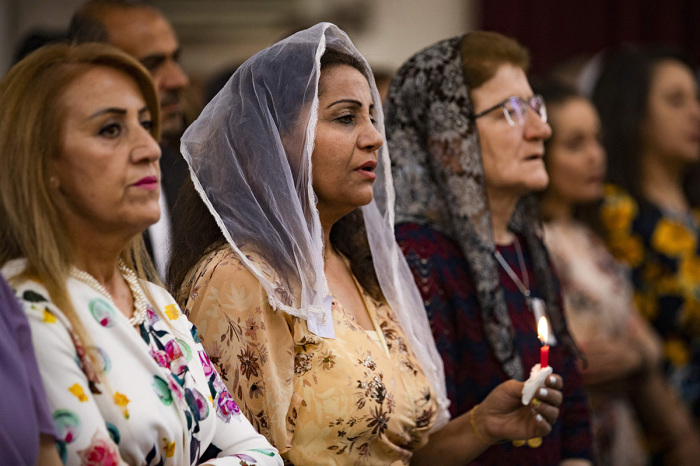USCIRF warns of threat to Christians in northwestern Syria

There’s a threat to the property, safety and existence of religious minority groups, including Christians, in northwestern Syria under the de facto governance of Hay’at Tahrir al-Sham, a former al-Qaeda affiliate and U.S.-designated terrorist group, says the U.S. Commission on International Religious Freedom in a new report.
The HTS-led Salvation Government continues to grow its administrative power in northwest Syria, which includes parts of the Idlib governorate, one of the last and largest strongholds against President Bashar al-Assad’s government, says USCIRF’s factsheet.
HTS, which is an evolving conglomerate of militant Islamist Syrian rebel groups, is attempting to rebrand as a legitimate civic authority and continues to “harass religious minorities and prevent them from the free practice of their religion, forbidding Christians’ ringing of church bells or holding some religious ceremonies.”
“Since 2015, religious minorities such as Christians and Druze have lost their homes and land to HTS and its predecessors,” the factsheet says. “Under the present Salvation Government, the Properties Committee continues to misappropriate Christians’ private properties and either redistribute them to HTS members and their families or rent them to internally displaced persons for the Salvation Government’s profit.”
It adds, “Evidence suggests that this confiscation scheme, which includes the ‘targeting’ of Christians, may amount to the war crime of pillage.”
What further compounds the perilous religious freedom conditions in and near Idlib is that HTS, which “remains a potent source of a Salafi-jihadism that restricts the religious freedom of non-conforming Sunni Muslims,” is cultivating a mutually and politically expedient relationship with Turkey, “which itself represents a distinct threat to vulnerable religious minority groups via its military incursions in northern Syria.”
Observers suspect that HTS “may have orchestrated recent violent attacks on religious minorities, such as a July 2022 explosion that targeted a Greek Orthodox church inauguration in Hama — a governorate that HTS partially controls.”
While Turkey has designated HTS as a terrorist organization, “perhaps in tacit exchange for HTS’ services as a watchdog and security force, it has not actively impeded the rebel group from gaining administrative power in Idlib in recent years,” USCIRF says.
If the geopolitical calculus of Syria changes, HTS’ brutality can escalate, warns USCIRF.
“For example, if the Assad regime reclaims territory in the northwest, HTS’ resulting loss of ‘state-building’ as a legitimate platform could prompt its return to large-scale acts of insurgency and terrorism, with severe consequences for religious freedom,” it explains. “Moreover, the group has accompanied its claims to additional territory with assertive and sometimes violent expressions of religious ideology.”
In its 2022 Annual Report, USCIRF recommended that the U.S. State Department redesignate HTS as an Entity of Particular Concern for its ongoing violations of religious freedom, and that the Treasury Department impose targeted sanctions on additional HTS leaders.
Global persecution watchdog Open Doors USA ranks Syria as the 15th-worst country in the world when it comes to Christian persecution. The Middle Eastern country's Christian population has dwindled since civil war began in 2011. Syria is also home to several Islamic extremist groups.
According to the watchdog, public expression of faith is dangerous for Christians in areas where extremists have territorial control.
"Even though the public threat of ISIS has largely subsided, Christians in Syria still grapple with daily persecution that may become violent. In areas where Islamic extremist groups are active, leaders of historical church communities may be targeted simply because they are more visible," an Open Doors fact sheet states. "But leaders of other Christian groups are also vulnerable because they may be more active in evangelism. Church buildings are completely destroyed in many parts of Syria where Islamic extremists had control (or continue to maintain control)."




























